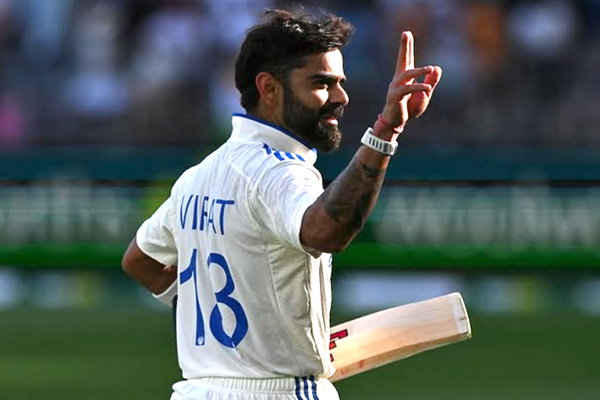.png)
Offscript Weekly: In The Fog Of News, Hope Shines Through
From blackouts to breakthroughs and a quiet exit, this week’s Offscript Weekly dives into truth, trust, and cautious optimism amid global shifts.


Ranjana Chauhan is a senior financial journalist. She brings sharp focus on the softer aspects of business and enjoys writing on diverse themes, from the gender lens to travel and sports.
May 13, 2025 at 7:50 AM IST
"A lie can travel halfway around the world while the truth is putting on its shoes."
– Jonathan Swift
This week, life threw us a harsh reminder of its fragility, of how truth and lies often become tangled in ways that are difficult to unravel. The India-Pakistan conflict dominated the news cycle.
In India’s ‘Operation Sindoor’ against Pakistan-bred terrorist outfits, a coordinated effort involving all three wings of the Armed Forces, the Air Force led the charge with precision strikes, backed by drones and loitering munitions for high-impact, targeted hits. Systems like the BrahMos cruise missile, along with SCALP and HAMMER bombs, were part of the mix, underscoring India’s defence capabilities.
What set this conflict apart was how it played out. If the Kargil War had the nation glued to the television, this one showcased digital power, particularly social media. Real-time updates, drone footage, and digital narratives became tools of war, shaping public perception as much as missiles shaped the battlefield.
Amid the chaos, one video stuck with me. It wasn’t fake. It was a raw, unsettling reality: a blackout in Amritsar. The Golden Temple, bathed in twinkling lights, suddenly went pitch dark. The last flicker of illumination before complete stillness felt crushing. This temple isn’t a just place of worship for a community. It transcends boundaries and represents a shared space of spirituality and calm.
To see it go dark and silenced felt symbolic of a sinister happening.
There was a swirl of rumours, half-truths, and outright lies. Panic spread faster than the truth could catch up. People rushed to stock up on supplies and to withdraw cash. Fear had its grip on everyone. Then came the announcement of a ceasefire – the waves of chaos settled as soon as they had erupted. The calm was fragile, yet there was calm. But the damage had already been done: trust was shaken, nerves frayed.
Amid the echo of war drums and digital noise, there came a departure that felt like a pause – emotion-laden and quietly historic. This came not from the battlefields but the cricket field.
Virat Kohli stepping away from Test cricket feels strangely personal. He arrived angry, hungry, a little rough around the edges. And over the years, we watched him evolve: not just into one of the greatest batters of our time but into a leader who made belief contagious. That 2018 win in Australia wasn't just a cricketing milestone; it was a shift in how India saw itself abroad. No more timid body language. No more settling. Just pride, grit, and the will to push through.
He wasn't perfect. That’s exactly why he mattered. He brought Test cricket to life again, made it feel urgent in an age of instant gratification. Every run, every stare-down, every pumped fist felt like a declaration. And behind all that fire, there was quiet discipline too - the athlete who made fitness non-negotiable, who led by example, who showed that intensity and control can go hand in hand.
Off the field, he grew into a family man - more grounded, more reflective, but never any less driven. He’ll be missed. Not just the batter or the captain, but the energy, the emotion, the sense that every ball, every moment, matters.
Back on the global stage and geopolitics, there’s a notable shift taking place. Washington and Beijing, after heightened tension, seem to have hit the pause button. New tit-for-tat tariffs are on hold, offering some relief to world markets and giving supply chains some breathing room.
Closer home, India and the US also seem to be moving towards a tariff deal. India has boldly proposed to significantly reduce the tariff gap that could pave the way for a new trade deal. Even as we all remained fixated with the US talks, there came a pleasant surprise in the form of a trade deal with the UK – one that was three years in the making.
This shift in geopolitics, while still fragile, feels cautiously optimistic. Speaking of unlikely shifts, US President Donald Trump has been quietly stacking up diplomatic wins: advancing talks between Russia and Ukraine, pushing for dialogue between India and Pakistan, and improving trade relations globally. While some might dismiss these moves as mere optics, there’s no denying that the world loves a good comeback story, and Trump’s manoeuvring is one that might just redefine his legacy on the global stage.
On tech, rather health tech, there’s a curious development that could easily be mistaken for a story of redemption. Billy Evans, former partner of convicted Theranos founder Elizabeth Holmes, is backing a new blood-testing startup ‘Haemanthus’. Despite striking similarities to Theranos and whispers of Holmes offering advice from prison, the venture has already raised $20 million.
Have investors really moved on?
Now for some climate-related headlines that caught my eye. Venice, the iconic “floating city” now threatened as a “sinking city” due to rising sea levels and over-tourism, is fighting back with flood barriers, visitor curbs, sustainable tourism initiatives, and a "drastic" likely solution to pump water into the earth deep below. This could potentially raise the seabed, lifting Venice by nearly 12 inches and give it a grace period of around 50 years!
While Venice struggles with the rising tide, India is quietly betting on its future too. A likely way-early onset of southwest monsoons signals relief for farmers and the economy. The likely bountiful rains could ease inflation and put more money into the hands of rural consumers that in turn would drive demand across sectors.
Talking of the farm sector, India is exploring the potential of genome-edited rice: an innovation designed to boost yields and resilience without the red flags that accompany GMOs. It could bring more food to the table without stepping on regulatory toes. And there’s some more positive news. India has reported a 1,445-sq km increase in its green cover since 2021 and said its carbon sink now absorbs 2.29 billion tonnes of CO2, helping the country inch closer to its 2030 sustainability goals.
So, while Venice may be sinking, there’s always room for hope and mindful progress. And that holds good for India too. May we find our way forward, one step at a time.
Let’s stay curious, keep questioning, and hold on to that quiet optimism.
Ranjana Chauhan



